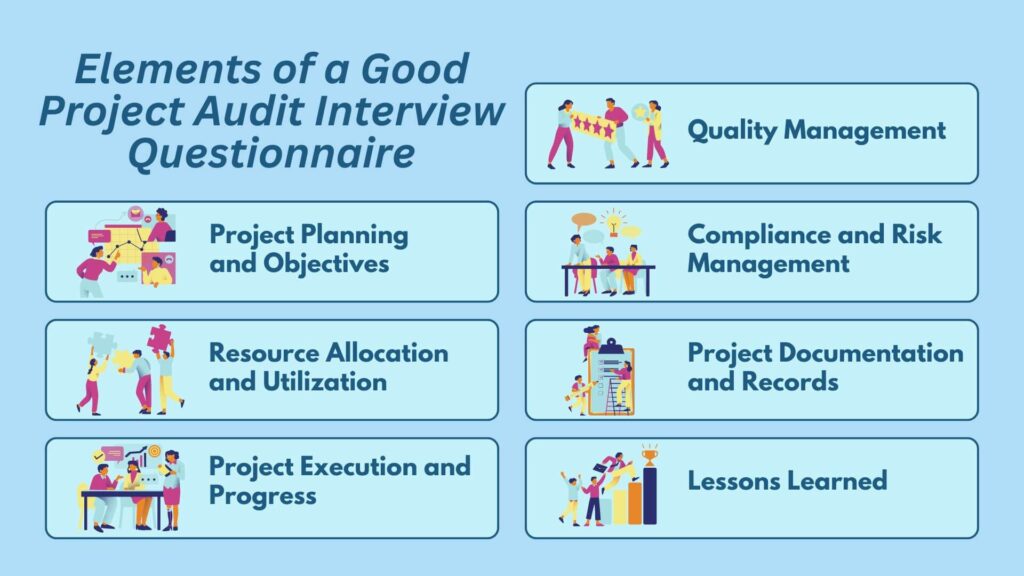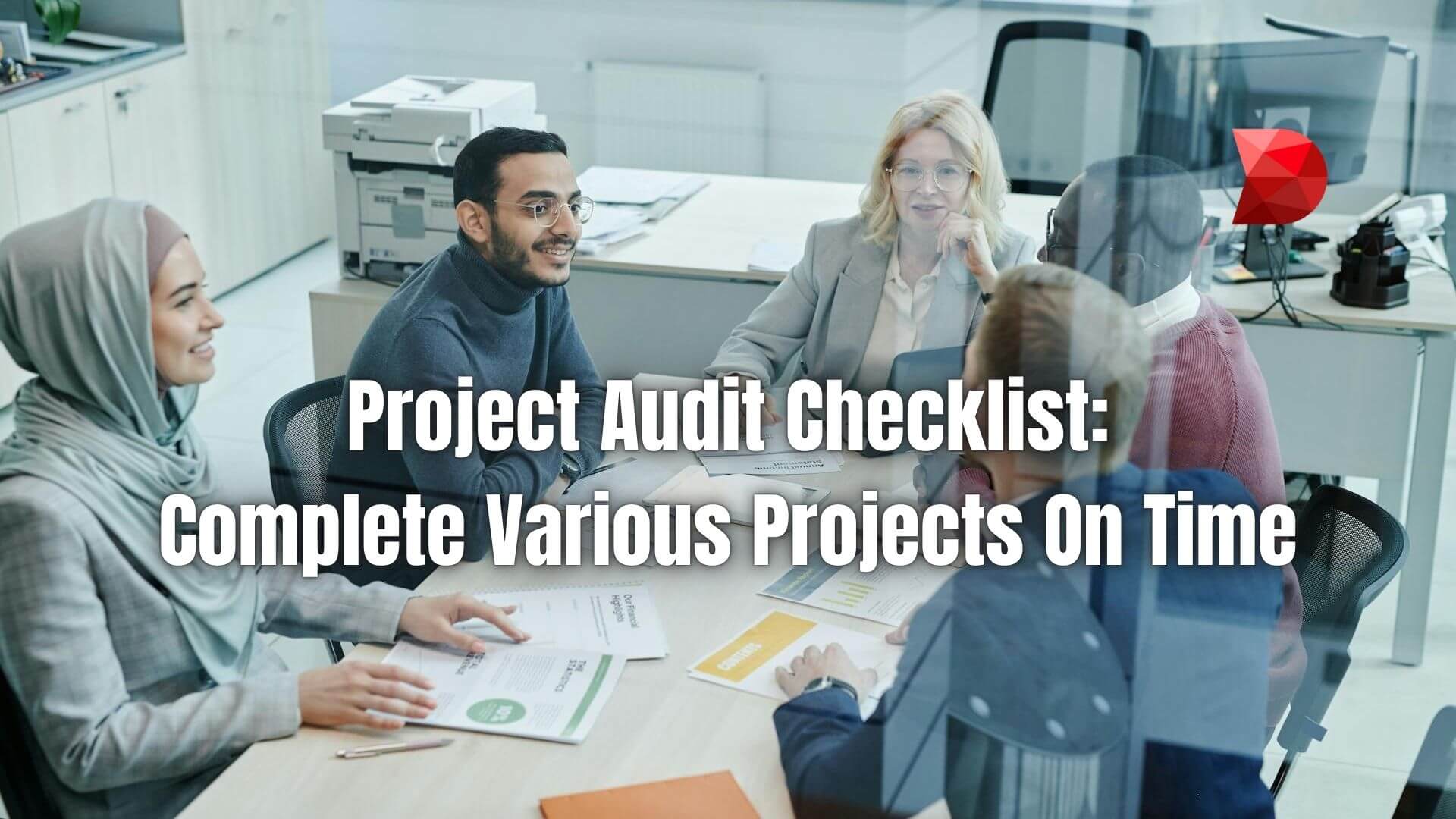Projects over budget, behind schedule, and lacking quality? It’s time for a project audit. An organized assessment of a project’s performance that pinpoints areas for development and makes sure it continues on course to achieve its goals is called a project audit.
But how exactly can you ensure your projects stay on course? To assist you in finishing a variety of projects on schedule, this article offers a thorough project audit checklist. By following this checklist, you can enhance project management, minimize risks, and deliver successful outcomes.
Table of Contents
ToggleWhat is a Project Audit?

A project audit is a methodical analysis of how well a project is performing in comparison to its intended goals. It involves a detailed review of project documentation, processes, and outcomes to identify strengths, weaknesses, and areas for improvement. Project audits are essential for determining project success, uncovering potential risks, and providing valuable insights for future endeavors.
While applicable to any project, project audits are commonly used in complex initiatives such as construction, engineering, software development, and organizational change. They typically include interviews with project team members, stakeholders, and clients to gather comprehensive information.
Main Types of Interviews During a Project Audit
Effective project audits rely heavily on gathering diverse perspectives. This is achieved through targeted interviews with key project participants.
Interviews with Sponsors and Project Managers
Sponsors and project managers play pivotal roles in project initiation and oversight. Interviews with these individuals should focus on:
- Project planning and initiation: Alignment of project goals with organizational objectives, clarity of project scope, and adequacy of initial resource allocation.
- Budget and cost control: Accuracy of budget estimates, financial performance tracking, and cost management strategies.
- Schedule adherence: Effectiveness of project planning and scheduling, identification of schedule variances, and corrective actions taken.
- Risk management: Identification and assessment of project risks, implementation of mitigation plans, and contingency measures.
- Stakeholder management: Effectiveness of communication and engagement with stakeholders, management of stakeholder expectations, and resolution of conflicts.
Interviews with Project Team Members
Project team members have firsthand knowledge of project execution challenges and opportunities. Interviews should explore:
- Task execution: Efficiency of task completion, identification of bottlenecks, and resource constraints.
- Communication and collaboration: Effectiveness of communication within the team and with other project stakeholders.
- Quality assurance: Adherence to quality standards, identification of quality issues, and corrective actions taken.
- Change management: Handling of project changes, impact assessment, and change control processes.
- Lessons learned: Determining what has to be improved for upcoming initiatives.
Interviews with Project Stakeholders
Project stakeholders provide valuable insights into the project’s impact and overall success. Interviews should focus on:
- Project outcomes: Alignment of project deliverables with stakeholder expectations and needs.
- Stakeholder satisfaction: Assessment of stakeholder satisfaction with project performance and communication.
- Benefits realization: Identification of benefits achieved and quantification of return on investment.
- Lessons learned from the stakeholder perspective: Feedback on project strengths and weaknesses.
By conducting comprehensive interviews with these key groups, project auditors can gain a holistic understanding of project performance and identify areas for improvement.
Elements of a Good Project Audit Interview Questionnaire
To collect thorough data regarding project performance, a project audit interview questionnaire must be well-structured. It should focus on key areas that impact project success, compliance, and efficiency.
A successful questionnaire includes questions that assess the following:

Project Planning and Objectives
- How were project goals and objectives defined and communicated?
- Was there adequate stakeholder involvement in the project planning phase?
- How was the project scope determined and managed?
Resource Allocation and Utilization
- Were project resources (budget, personnel, equipment) sufficient and effectively allocated?
- How was resource performance monitored and evaluated?
Project Execution and Progress
- What methods were used to track project progress and milestones?
- How were project changes managed and controlled?
- Were there any significant challenges or risks encountered during project execution?
Quality Management
- What quality standards and metrics were established for the project?
- How was product or service quality measured and ensured?
Compliance and Risk Management
- Were there any compliance issues or risks identified during the project?
- How were compliance and risk management processes implemented?
Project Documentation and Records
- What project documentation was maintained, and how was it organized?
- Are project records complete and accurate?
Lessons Learned
- What lessons were learned from the project, and how can they be applied to future projects?
By addressing these areas, project auditors can gain valuable insights into project performance and identify opportunities for improvement.
Sample Project Audit Checklist Template
Take a look at the following project audit template to get a visual depiction of the project audit checklist. This structure effectively organizes audit criteria, making it easy to review and complete:
| Sample Project Audit Checklist Template | |||
| Project Name: | |||
| Audit Date: | |||
| Auditor(s): | |||
| Item | Section/Criteria | Yes/No (Y/N) | Remarks |
| 1 | Project Initiation and Planning | ||
| 1.1 | Is there a clear project charter outlining project objectives, scope, and deliverables? | ||
| 1.2 | Was a comprehensive project plan developed, including timelines, milestones, and resource allocation? | ||
| 1.3 | Were project stakeholders identified and their roles and responsibilities defined? | ||
| 1.4 | Was a risk assessment conducted, and mitigation plans developed? | ||
| 2 | Project Execution | ||
| 2.1 | Are project activities aligned with the project plan? | ||
| 2.2 | Are project resources being utilized effectively and efficiently? | ||
| 2.3 | Are project deliverables meeting quality standards? | ||
| 2.4 | Is change management being handled effectively? | ||
| 2.5 | Is communication with stakeholders clear and consistent? | ||
| 3 | Project Monitoring and Control | ||
| 3.1 | Are project performance metrics being tracked and analyzed? | ||
| 3.2 | Are project issues being identified and addressed promptly? | ||
| 3.3 | Is the project budget on track? | ||
| 3.4 | Are project risks being monitored and managed? | ||
| 4 | Project Closure | ||
| 4.1 | Are project deliverables complete and accepted by stakeholders? | ||
| 4.2 | Is project documentation complete and accurate? | ||
| 4.3 | Has a project evaluation been conducted to identify lessons learned? | ||
| Audit Findings and Recommendations | |||
| Overall Project Assessment | |||
Note: This is a basic template, and it may need to be customized based on project-specific requirements and industry standards.
Frequently Asked Questions (FAQs)
Q1: How often should a project audit be conducted?
The frequency of project audits depends on several factors, including project complexity, risk level, and organizational requirements. Generally, smaller, low-risk projects may require less frequent audits, while larger, complex projects may benefit from more regular assessments. A common approach is to conduct audits at key project milestones, such as initiation, planning, execution, monitoring and control, and closure.
Q2: Who should be involved in conducting a project audit?
The composition of the audit team can vary depending on the project size and complexity. Typically, a project audit involves a mix of internal and external stakeholders.
Internal members may include project managers, team leads, quality assurance personnel, and risk managers. External auditors or consultants can provide an independent perspective and specialized expertise.
Q3: How can I ensure that the project audit checklist is comprehensive?
To create a comprehensive project audit checklist, consider aligning it with your organization’s project management methodology and industry standards. It’s essential to include criteria that cover the entire project lifecycle, from initiation to closure.
Additionally, involving key stakeholders in the checklist development process can help ensure that it addresses their specific needs and concerns.
Q4: What should be done with the findings of a project audit?
Project audit findings should be documented and communicated to relevant stakeholders. The findings should be analyzed to identify the root causes of issues and develop corrective action plans.
It’s crucial to track the implementation of corrective actions and measure their effectiveness. Lessons learned from the audit should be incorporated into future project management processes.
Q5: How can I ensure that the project audit process is efficient and effective?
Consider using automated tools for data collection and analysis to optimize the audit process. Clear audit objectives and scope definition are essential.
Effective communication and collaboration among audit team members are crucial for efficient execution. Regular training and development of auditors can enhance their skills and knowledge.
Q6: What is the relationship between a project audit and a project evaluation?
While project audits and evaluations share similarities, they serve distinct purposes. A project audit focuses on assessing project performance against predefined criteria and identifying areas for improvement.
In contrast, a project evaluation typically occurs at the end of the project and assesses the project’s overall success in achieving its objectives and meeting stakeholder expectations.
Conclusion
Conducting regular project audits is essential for ensuring project success, identifying areas for improvement, and mitigating risks. By following the project audit checklist provided in this article, you can systematically evaluate your projects and make data-driven decisions.
The goal of this article was to equip you with the knowledge and tools necessary to conduct effective project audits. Understanding the importance of audits, knowing what to look for, and having a structured checklist will empower you to enhance project performance and achieve desired outcomes.
Now, it’s time to put this knowledge into action. Start by creating a tailored project audit checklist based on your specific project requirements. Conduct thorough interviews with stakeholders, analyze the data, and implement necessary corrective actions.
By incorporating project audits into your project management process, you can significantly improve project outcomes and build a reputation for delivering successful projects on time and within budget.
Streamline Project Audits with DATAMYTE
DATAMYTE is a quality management platform with low-code capabilities. Our Digital Clipboard, in particular, is a low-code workflow automation software that features a workflow, checklist, and smart form builder. This tool lets you create and utilize a comprehensive project audit checklist, ensuring that all audit tasks are consistently performed and documented.
DATAMYTE also lets you conduct layered process audits (LPA), a high-frequency evaluation of critical process steps, focusing on areas with the highest failure risk or non-compliance. Conducting LPA with DATAMYTE lets you effectively identify and correct potential defects before they become major quality issues.
With DATAMYTE, you have an all-in-one solution for enhancing the efficiency and effectiveness of your project audits, from checklist creation to real-time monitoring and corrective actions. Book a demo now to learn more.



